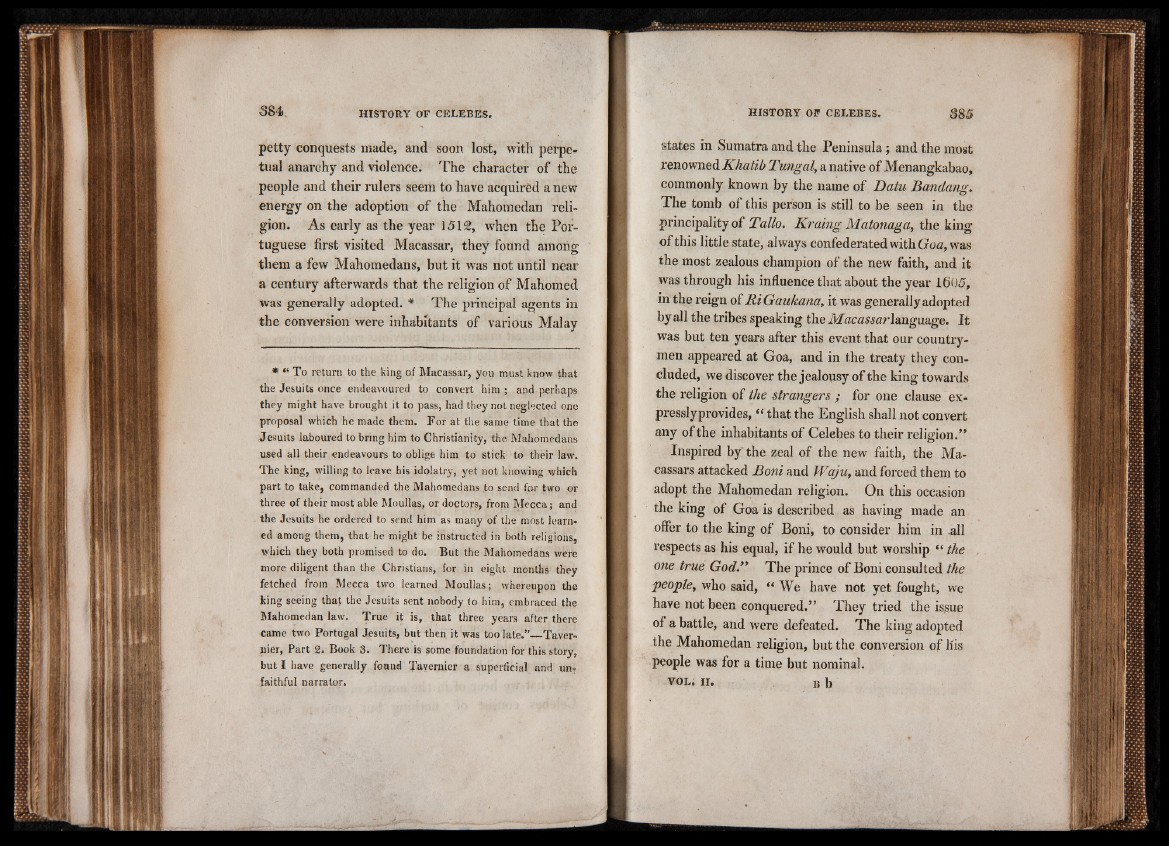
petty conquests made, and soon lost, with perpetual
anarchy and violence. The character of the
people and their rulers seem to have acquired a new
energy on the adoption of the Mahomedan religion.
As early as the year 1512, when the Portuguese
first visited Macassar, they found among
them a few Mahomedans, but it was not until near
a century afterwards that the religion of Mahomed
was generally adopted. * The principal agents in
the conversion were inhabitants of various Malay
* “ To return to the king of Macassar, you must know that
the Jesuits once endeavoured to convert him ; and perhaps
they might have brought it to pass, had they not neglected one
proposal which he made them. For at the same time that the
Jesuits laboured to bring him to Christianity, the Mahomedans
used all their endeavours to oblige him to stick to their law.
The king, willing to leave his idolatry, yet not knowing which
part to take, commanded the Mahomedans .to send for two or
three of their most able Moullas, or doctors, from M ecca; and
the Jesuits he ordered to send him as many of the most learn,
ed among them, that he might be instructed in both religions,
which they both promised to do. But the Mahomedans were
more diligent than the Christians, for in eight months they
fetched from Mecca two learned Moullas; whereupon the
king seeing that the Jesuits sent nobody to him, embraced the
Mahomedan law. True it is, that three years after there
came two Portugal Jesuits, but then it was too late.” Tavernier,
Part 2. Book 3. There is some foundation for this story,
but I have generally found Tavernier a superficial and unfaithful
narrator.
states in Sumatra and the Peninsula; and the most
renowned Khatib Tungal, a native of Menangkabao,
commonly known by the name of Datu Bandang.
The tomb of this person is still to be seen in the
principality of Tallo. Kraing Matonaga, the king
of this little state, always confederated with Goa, was
the most zealous champion of the new faith, and it
was through his influence that about the year 1605,
in the reign of Ri Gaukana, it was generally adopted
by all the tribes speaking the Macassar language. It
was but ten years after this event that our countrymen
appeared at Goa, and in the treaty they concluded,
we discover the jealousy of the king towards
the religion of the strangers ; for one clause ex-
presslyprovides, “ that the English shall not convert
any of the inhabitants of Celebes to their religion.”
Inspired by' the zeal of the new faith, the Macassars
attacked Boni and Waju, and forced them to
adopt the Mahomedan religion. On this occasion
the king of Goa is described as having made an
offer to the king of Boni, to consider him in .all
respects as his equal, if he would but worship “ the
one true God.” The prince of Boni consulted the
people, who said, “ We have not yet fought, we
have not been conquered.” They tried the issue
of a battle, and were defeated. The king adopted
the Mahomedan religion, but the conversion of his
people was for a time but nominal.
VOL. I I. B b